Ref.>"中国、世界各地に100カ所超の「海外秘密警察署」、「領事コールセンター」と説明"
>"空自 F-15戦闘機を比に派遣、戦後初、南シナ海の軍事拠点化進める中国念頭に防衛協力を強化"
-----------------------------------------
> 中國「國外警察站」:荷蘭政界要求即時關停 北京稱說法「不實」 -- BBC News 中文
↓(See detail of this article)、夕刊フジの記事の翻訳(Translation of an article of Evening Newspaper Fuji)
Translation;[Common Knowledge Revisited by K. Gilbert]. The Kishida administration must address China's "unofficial police station" firmly -- even a "bad precedent" of the "Kidnapping of Kim Dae-jung," future S. Korean President, in Chiyoda Ward in the past
>"[ニッポンの新常識]. 岸田政権は中国の「非公式警察署」に断固対処せよ かつて後の韓国大統領が千代田区で拉致「金大中事件」の〝あしき前例〟も(1"
> 中国が、日本を含む 30ヵ国に「非公式警察署」を設置していたとされる問題が注目されている。
> スペインの NGO(非政府組織)が9月以降、日本や米国、英国、ドイツなど、30ヵ国の 70ヵ所に拠点があり、反体制的人物の追跡、強制帰国にも関与していると報告書で明らかにしたという。
> 世界各国は主権侵害の疑いで調査・捜査に着手している。
The issue that China allegedly has established "unofficial police stations" in 30 countries, including Japan, is paid attention.
Since September, a Spanish NGO (non-governmental organization) revealed in its report that it has bases in 70 locations in 30 countries, including Japan, the U.S., the U.K. and Germany, and are involved in tracking dissidents and forcing them to return home.
Countries around the world are started survey & investigations on suspicion of sovereignty infringement.
> 日本の拠点は、在日中国人の友好・親睦団体の所在地と一致すると報じられた。
> 私は以前、著書『>"いまそこにある中国の日本侵食"』(ワック)で、中国は「文化交流」「友好」などの表向きの看板を立てて、スパイ活動をしている危険性があると警鐘を鳴らした。
> 私が今回、憤りを感じるのは、中国政府とともに日本政府の対応だ。
The base in Japan was reported to coincide with the location of a friendship & fellowship group for Chinese residents in Japan.
In the past in my book "The Erosion of Japan bu China is just here now" (WAC BUNKO, correct title in English is unknown), I rang an alarm that there was a risk that China was spying on us by putting up signs such as "cultural exchange" and "friendship."
What makes me anger this time is the Tokyo's measures as well as Beijing.
> 岸田文雄政権は当初、拠点の存在を肯定も否定もしなかった。
> 松野博一官房長官は先月14日の定例会見で、「ご指摘の報道は承知しているが、私からお答えすることは差し控える」と述べていた。
> 林芳正外相が同 29日になって、中国側に外交ルートで「懸念」を伝えたことを明らかにした。
> 日本で「非公式警察署」が話題になったのは11月中旬である。
> 世界各国が調査・捜査に着手し、閉鎖命令を出すなか、遅すぎて甘すぎると感じる。
The Fumio Kishida administration initially neither confirmed nor denied the existence of the base.
At a regular press conference on Nov. 14, Chief Cabinet Secretary Hirokazu Matsuno said that "We know about the reports you pointed out. However, I will refrain from answering."
On Nov. 29, Foreign Minister Yoshimasa Hayashi revealed that he conveyed the "concerns" to China through diplomatic channels.
It was mid-November that "unofficial police stations" became a hot topic in Japan.
Under the circumstances that countries around the world started survey & investigations and issued shutdown orders, I feel it's too late and too naive.
>"[ニッポンの新常識]. 岸田政権は中国の「非公式警察署」に断固対処せよ かつて後の韓国大統領が千代田区で拉致「金大中事件」の〝あしき前例〟も(2"
>「非公式警察署」が、中国が反体制的人物の把握や、強制帰国に関与しているとすれば、国際的な人権問題だ。
> 毅然と対応しなければ、「日本は主権侵害に鈍い」「人権問題を軽視している」と言われかねない。
>「孔子学院」をめぐる対応もそうだが、他国のように、NGOの報告書が出た直後から調査・捜査に乗り出すのが筋だろう。
It is an international human rights issue, if the "unofficial police stations" are involved in China's apprehension & forceful repatriation of dissidents.
If it does not address it firmly, it will possibly be said that "Japan is lax about infringing on sovereignty" and "disregarding human rights issues."
As with the response to the Confucius Institutes, it's rational for Japan to begin survey and investigations immediately after the NGO report was released, as in other countries.
> 日本では1973年、後の韓国大統領となる金大中氏が、同国の情報機関によって東京都千代田区のホテルから拉致される「金大中事件」という〝あしき前例〟がある。
> スパイ行為の嫌疑があっても、日本には「スパイ防止法」がなく、他国の諜報・工作活動を取り締まる法制が追いついていないのだ。
>「非公式警察署」のような前例が積み重なると、「日本=安全な国ではない」とのレッテルが張られかねない。
> 独立国家として「スパイ防止法」の制定は不可欠だろう。
Japan has the "bad precedent" of the "Kidnapping of Kim Dae-jung" -- In 1973, Kim Dae-jung, future S. Korean President, was abducted from a hotel in Chiyoda Ward in Tokyo by the country's intelligence services.
Despite allegations of espionage, Japan doesn't have an "anti-espionage law." Legislation to crack down on intelligence & operative activities by other countries is insufficient.
If precedents like the "unofficial police stations" pile up, it could be labeled that "Japan = not a safe country."
As an independent country, the enactment of an "anti-espionage law" is "must."
> 中国の軍事的覇権拡大を阻止するため、米国と英国、オーストラリア、カナダ、ニュージーランドによる機密情報共有枠組み「ファイブ・アイズ」に、日本の参加が検討されたと報じられたことがある。
> 5ヵ月レベルの機密保護ができればいいが、現状では中国側の監視網に加担しているように見えなくもない。
It's once reported that Japan's participation in the "Five Eyes" -- an intelligence-sharing framework among the U.S., the U.K., Australia, Canada and New Zealand -- was considered to prevent China from expanding its military hegemony.
It would be nice to have security protection at the level of the five countries. However, at present, it possibly seems that (Japan) has cooperated with monitoring network on the Chinese side.

最新の画像[もっと見る]
-
 翻訳;石破氏、選択的夫婦別姓導入に前向き姿勢
2週間前
翻訳;石破氏、選択的夫婦別姓導入に前向き姿勢
2週間前
-
![翻訳:[ソウルからヨボセヨ]. 韓中歴史戦争の現住所](https://blogimg.goo.ne.jp/image/upload/f_auto,q_auto,t_image_square_m/v1/user_image/3d/02/46923dafa728dde7492822ed73ad1551.jpg) 翻訳:[ソウルからヨボセヨ]. 韓中歴史戦争の現住所
8ヶ月前
翻訳:[ソウルからヨボセヨ]. 韓中歴史戦争の現住所
8ヶ月前
-
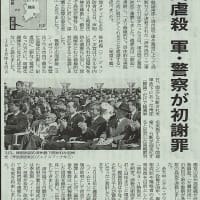 翻訳;新藤かな(港区区議会議員, 無所属)の X (on '23. 12/11)
9ヶ月前
翻訳;新藤かな(港区区議会議員, 無所属)の X (on '23. 12/11)
9ヶ月前
-
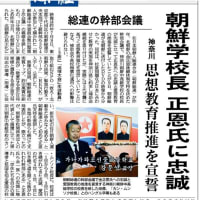 翻訳:「朝鮮学校の存在知って」 無償化求める裁判記録の上映会
11ヶ月前
翻訳:「朝鮮学校の存在知って」 無償化求める裁判記録の上映会
11ヶ月前
-
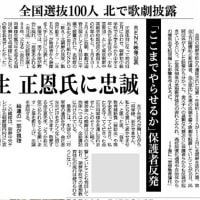 翻訳:「朝鮮学校の存在知って」 無償化求める裁判記録の上映会
11ヶ月前
翻訳:「朝鮮学校の存在知って」 無償化求める裁判記録の上映会
11ヶ月前
-
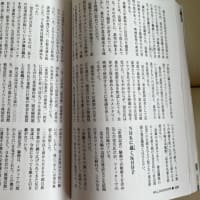 翻訳;崔碩栄の X(on '23. 9/12)
12ヶ月前
翻訳;崔碩栄の X(on '23. 9/12)
12ヶ月前
-
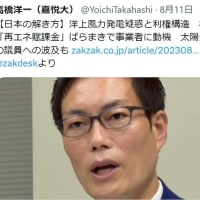 翻訳:高浜2号機の燃料装填完了 関西電力、9月再稼働へ
1年前
翻訳:高浜2号機の燃料装填完了 関西電力、9月再稼働へ
1年前
-
![翻訳:[ソウルからヨボセヨ]. アサヒの大逆襲](https://blogimg.goo.ne.jp/image/upload/f_auto,q_auto,t_image_square_m/v1/user_image/40/c2/8f01d7d86ad79316f7e46787892ac0e1.jpg) 翻訳:[ソウルからヨボセヨ]. アサヒの大逆襲
1年前
翻訳:[ソウルからヨボセヨ]. アサヒの大逆襲
1年前
-
![翻訳:[ソウルからヨボセヨ]. アサヒの大逆襲](https://blogimg.goo.ne.jp/image/upload/f_auto,q_auto,t_image_square_m/v1/user_image/6e/77/246585ce51dc216cac7a9d5a930b8e5a.jpg) 翻訳:[ソウルからヨボセヨ]. アサヒの大逆襲
1年前
翻訳:[ソウルからヨボセヨ]. アサヒの大逆襲
1年前
-
 翻訳:「レイプ計画立てている」と女性に脅迫文 元共産党千葉県幹部を起訴
1年前
翻訳:「レイプ計画立てている」と女性に脅迫文 元共産党千葉県幹部を起訴
1年前
「Translation」カテゴリの最新記事
 翻訳;韓国の元慰安婦が死去、生存者は8人に= 韓国ネット「日本の謝罪する姿が見...
翻訳;韓国の元慰安婦が死去、生存者は8人に= 韓国ネット「日本の謝罪する姿が見... 翻訳;中国とロシアの防衛協力拡大懸念 米、軍態勢は変更せず
翻訳;中国とロシアの防衛協力拡大懸念 米、軍態勢は変更せず 翻訳;北朝鮮、核兵器の増産方針を維持 金正恩氏演説、衛星計画に触れず
翻訳;北朝鮮、核兵器の増産方針を維持 金正恩氏演説、衛星計画に触れず 翻訳;門田隆将(作家・ジャーナリスト)の X(on '24. 9/10)
翻訳;門田隆将(作家・ジャーナリスト)の X(on '24. 9/10) 翻訳;白川司(千代田区区議会議員)の X(on '24. 9/10)
翻訳;白川司(千代田区区議会議員)の X(on '24. 9/10) 翻訳;西村幸祐(ジャーナリスト)の X(on '24. 9/10)
翻訳;西村幸祐(ジャーナリスト)の X(on '24. 9/10) 翻訳;千葉麗子の X(on '24. 9/10)
翻訳;千葉麗子の X(on '24. 9/10) 翻訳;新藤かな(港区区議会議員, 無所属)の X (on '24. 9/10)
翻訳;新藤かな(港区区議会議員, 無所属)の X (on '24. 9/10) 翻訳;崔碩栄の X(on '24. 9/10)
翻訳;崔碩栄の X(on '24. 9/10) 翻訳;杉田水脈議員(自民党)の X(on '24. 9/10)
翻訳;杉田水脈議員(自民党)の X(on '24. 9/10)















※コメント投稿者のブログIDはブログ作成者のみに通知されます